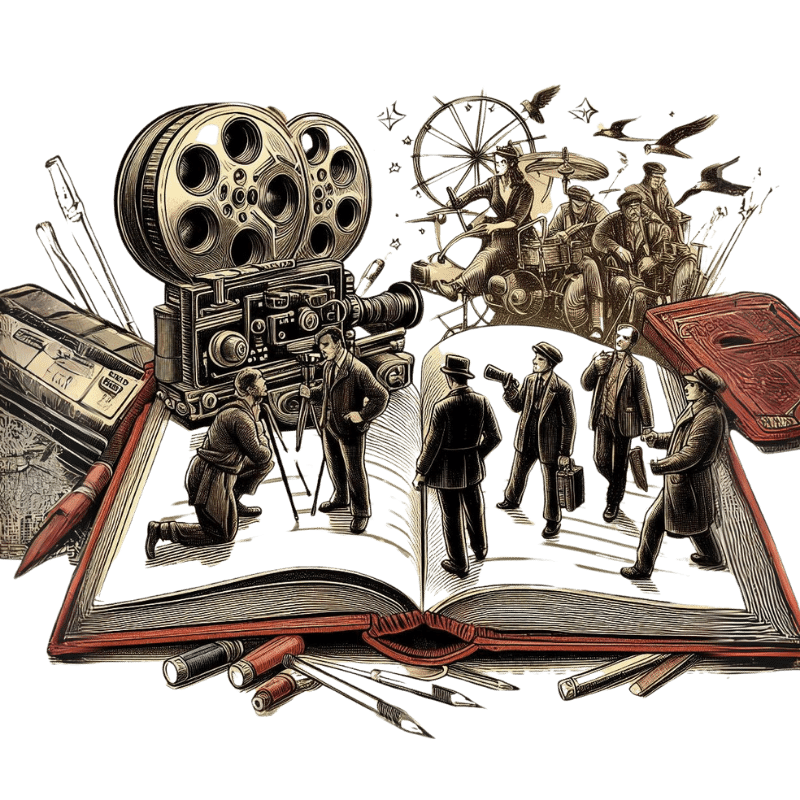
We’ve all been there – excitedly marking our calendars for the release of our favorite book’s movie adaptation, only to leave the theater feeling a little disappointed. Don’t get me wrong, I love a good movie just as much as the next person. But as an avid reader, I’ve learned that the book is almost always a superior experience to its film version.
Now, film is an incredible art form with its own unique advantages. Seeing your imagination brought to vivid life on the big screen is a thrill like no other. But its very strengths as a visual medium can also be its downfall when adapting books. No matter how skilled the director or lavish the production, a movie just can’t capture everything that makes the written work so special.
A Single Vision Vs. A Venture
Literature, especially classic literature is the product of a single creative mind, for better or worse. When an author sits down to write a novel, it is their singular vision that shapes the entire story from beginning to end. While collaboration with editors helps refine the work, the core ideas and execution stem from an individual perspective.
Films, on the other hand, are massive collaborative efforts involving hundreds of people. Movies require huge budgets, technology, locations, casting, costumes, visual effects and more. All of these additional elements mean film adaptations are constrained by financial and logistical factors that literary works do not have to consider.
Writers have complete freedom to let their imaginations run wild, describing settings and scenarios that would be impossible or too expensive to recreate on screen. This means books are often bolder and less restricted in what they can include or explore. While filmmakers do an admirable job adapting complex stories to the screen, the solitary process of literary creation will always grant authors more room for unconstrained creative expression.
The Inner World Is Unfilmable
Many brilliant works of literature are simply unfilmable because their most profound moments happen entirely within the protagonist’s inner mind. When we read, we are privy to a character’s private thoughts, dreams, memories, and internal dialogue.
Films have no way to truly recreate such intimate insights without resorting to voiceover narration or other devices that break the immersion of seeing events unfold. Some of the most beloved novels rely heavily on the exploration of psychology and consciousness that would be impossible to directly translate to visual storytelling.
Stories that follow twisting plots and timelines within a character’s psyche, like Joyce’s Ulysses, could never faithfully capture their essence on screen. The deepest revelations and most poignant character arcs in these inimitable books live solely in the realm of imagination.
While film adaptations may attempt to convey the overall themes or narrative arcs, they could never replace the profound experience of seeing the world through another’s eyes via the written word alone. For this reason, some literary masterpieces are destined to remain untranslatable to film and can only truly be appreciated in their original written form.
A History Of Stories
Literature also has the profound advantage of spanning thousands of years and allowing readers to experience worlds and perspectives across centuries, from the people who lived in them.
The written word has been sharing stories for millennia, offering a window into how people lived, loved, and understood the world dating back to some of the earliest works in history.
Readers can immerse themselves in tales from authors living in completely different eras with wholly unique societal contexts. Literature preserves these glimpses into the human experience throughout the ages.
Film, on the other hand, is a medium that has only existed in its current form for around a century. While movies continue to push the boundaries of visual storytelling, the timeframe of cinema pales in comparison to literature’s enduring legacy across thousands of years of human civilization.
Picking up a book transports readers across not just settings, but entire epochs, allowing for a richness of cultural understanding impossible to achieve within film’s relatively narrow historical confines. In the written word, we discover a diversity of perspectives that could never be matched by a visual medium so young in the grand scheme of world history and the development of the human narrative.
A Book Is Always Better Than A Movie
While film adaptations will continue to bring beloved books to life on screen, the written work will always remain unparalleled in its depth, imagination, and ability to transport readers across centuries.
As the saying goes, a picture may be worth a thousand words – but in literature, those words create worlds, plunge into the human psyche, and preserve our shared narrative across millennia in a way that no visual medium can replicate.
Movies aim to bring stories to new audiences, but books will endure as singular works of art that push creative boundaries and keep us forever returning to experience profound worlds purely through the power of words.
So next time a film version of your favorite novel is released, don’t forget to savor the original story further by revisiting it on the page. After all, that is where the most vivid, immersive, and timeless versions will always reside.
